The U.S. State Department is concerned about Iran’s nuclear program following a confidential report Monday from the International Atomic Energy Agency that said Iran has amassed more highly enriched uranium.
Iran has increased its quantity of enriched uranium that is near weapons-grade levels, the United Nations nuclear watchdog said in the report.
The report, seen by The Associated Press, said Iran’s supply of enriched uranium has reached 30 times more than the amount agreed on in a 2015 deal between Tehran and world powers to limit Iran’s nuclear program.
Iran’s stockpile of enriched uranium is more than 6,201.3 kilograms (13,671.5 pounds) — a 675.8 kilogram (1,489.8 pound) increase since the IAEA’s last report in February.
A State Department spokesperson told VOA’s Persian Service the U.S. appreciates the IAEA's extensive efforts to "engage Iran on longstanding questions related to Iran’s safeguards obligations."
The official said Washington is in full support of the efforts of the U.N. nuclear watchdog and IAEA Director Rafael Grossi.
Grossi warned last month that Iran has had enough highly enriched uranium for “several” nuclear bombs if it chooses to build them.
"The level of inspection [in Iran] is not at the level we should have," he told Sky News in April.
Iranian officials have threatened they could pursue atomic weapons. Iran has said its nuclear program is peaceful.
The U.N. and Iran have not yet come to an agreement over a 2023 deal on expanding inspection of the Islamic Republic's nuclear program.
The report said Tehran has not reconsidered its September decision to prevent the most experienced IAEA nuclear inspectors from monitoring its nuclear facilities, adding that it expects Iran “to do so in the context of the ongoing consultations between the agency and Iran.”
Tensions have heightened between the IAEA and Iran and since former President Donald Trump unilaterally withdrew the U.S. from Tehran's nuclear deal with world powers in 2018.
IAEA surveillance cameras have been disrupted, while Iran has barred some of the agency's most experienced inspectors from its nuclear program.
Tehran launched an unprecedented drone and missile attack on Israel in April. The strike followed Israel's apparent attack on an Iranian consular building in Syria that killed two Iranian generals and others.
Experts suggest Iran could pursue a nuclear bomb if there was a major attack on the country.
VOA’s Persian Service contributed to this report. Some information came from The Associated Press and Agence France-Presse.





